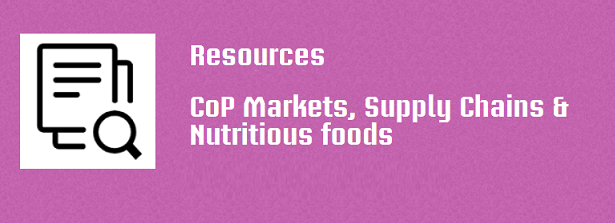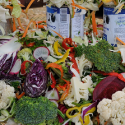Resources CoP Markets, Supply Chains & Nutritious foods

During the online meetings, CoP members refer to several documents and information, which will regularly be added to the resources list in this post.
Various organizations; Rapid Assessment in Delta Regions Myanmar
More than 500 farmers, extension officers, input suppliers, traders and microfinance officers have participated in the survey, to understand the impact of COVID-19 for farmers and other stakeholders in the farming value chain. Satellite maps and data for May ’20 harvesting crops and monsoon season were also being provided to help policymakers and other donors to have a better view of the current situation. The assessment was Funded by LIFT, Mercy Corps and Welthungerhilfe, and conducted in collaboration with Village Link.
Please download the “Delta Rapid Market Assessment Report – Understanding the impact of COVID-19 on rural smallholder farmers and food systems in the Ayeyarwady Delta”.
WUR assessment alerts
Stakeholders in seed and other agricultural sectors are facing critical challenges to their normal activities. Without fast and informed action, the COVID-19 crisis risks becoming a food crisis. Wageningen University & Research (WUR) and partners are collaborating to identify priority steps for enhancing food systems’ resilience in low and middle income countries. A first series of rapid assessments has been published for the seed sector in Ethiopia, Myanmar, Nigeria and Uganda.
Reports of the sector assessments can be found on the website.
GAIN bi-weekly rapid assessment reports
The Global Alliance for Improved Nutrition (GAIN) publishes a document series summarising some rapid assessments undertaken to understand early impacts of the Covid-19 coronavirus pandemic on food systems in a set of low- and middle-income countries where GAIN works (Bangladesh, India, Pakistan, Indonesia, Mozambique, Ethiopia, Kenya, Tanzania, Rwanda, and Nigeria). A particular focus is placed on small- and medium-sized enterprises (SMEs) within the food system.
Please follow this link to the series “Impact of Covid-19 on food systems: a situation report”.
GAIN; report on Covid-19 impact on SMEs in food systems in 17 countries
The COVID-19 pandemic and associated control measures have been having far-reaching effects on societies worldwide, and food systems have not been spared. To better understand these impacts, GAIN and partners, including the Scaling Up Nutrition (SUN) Business Network (co-convened by the World Food Programme (WFP)), undertook a survey of over 350 food system SMEs in 17 countries in early May 2020, aiming to assess the impacts of the COVID-19 pandemic and associated control measures on their businesses and their support needs.
This report summarises the main findings, offering recommendations for action.
2SCALE survey of business partners
In recent months, the COVID-19 pandemic has troubled the world. Beyond a health crisis, it has also caused an economic crisis. Food systems are also greatly affected, but it is not that easy to understand the details of this. As it is very important for 2SCALE to understand this impact and act upon it, they asked their private sector partners: How do you deal with this pandemic?
Please follow this link to the news item in which the results of the survey are shared.
SNV blogs on their Covid-19 response activities
As an organisation dedicated to the freedom of people to pursue their own sustainable development, SNV joins the world community in fighting the devastating social and economic impacts of the coronavirus disease (COVID-19) as it ravages our world. SNV remains fully operational in our 25+ countries across Asia, Africa and Central America. Fortunately, and the country teams have good visibility on how the crisis is developing so we can customise our responses.
On this page, SNV shares the latest resources on COVID-19.
IFPRI COVID-19 Policy Response (CPR) Portal
The CPR Portal systematically captures national and subnational policy responses to the pandemic through multiple channels, including population restrictions, social protection, trade, health, fiscal, and monetary measures. The Portal also includes the range of institutional collaborations governments have used to manage the pandemic, as well as varying levels of citizen compliance. The database can be used by researchers and policymakers to gain insights on the optimal policies for fostering resilient food systems during crises.
Visit the CPR Portal.






